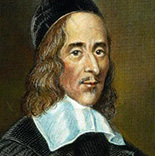 George Herbert (April 3, 1593 – March 1, 1633) was a Welsh-born poet, orator and priest of the Church of England. Herbert’s poetry is associated with the writings of the metaphysical poets, and he is recognized as “one of the foremost British devotional lyricists.”
George Herbert (April 3, 1593 – March 1, 1633) was a Welsh-born poet, orator and priest of the Church of England. Herbert’s poetry is associated with the writings of the metaphysical poets, and he is recognized as “one of the foremost British devotional lyricists.”
Born into an artistic and wealthy family, Herbert was largely raised in England and received there a good education that led to his admission in 1609 as a student at Trinity College, Cambridge. He went there at first with the intention of becoming a priest, but when eventually he became the University’s Public Orator he attracted the attention of King James I.
In 1624 and briefly in 1625 he served in the Parliament of England. After the death of King James, Herbert’s interest in ordination renewed. In his mid-thirties he gave up his secular ambitions and took holy orders in the Church of England, spending the rest of his life as the rector of the little parish of St Andrews Church, Lower Bemerton, Salisbury. He was noted for unfailing care for his parishioners, bringing the sacraments to them when they were ill, and providing food and clothing for those in need. Henry Vaughan called him “a most glorious saint and seer”. Never a healthy man, he died of consumption at the early age of 39.
AARON
George Herbert
Holiness on the head,
Light and perfections on the breast,
Harmonious bells below, raising the dead
To lead them unto life and rest:
Thus are true Aarons drest.
Profaneness in my head,
Defects and darkness in my breast,
A noise of passions ringing me for dead
Unto a place where is no rest:
Poor priest, thus am I drest.
Only another head
I have, another heart and breast,
Another music, making live, not dead,
Without whom I could have no rest:
In him I am well drest.
Christ is my only head,
My alone-only heart and breast,
My only music, striking me ev’n dead,
That to the old man I may rest,
And be in him new-drest.
So, holy in my head,
Perfect and light in my dear breast,
My doctrine tun’d by Christ (who is not dead,
But lives in me while I do rest),
Come people; Aaron’s drest.
=====
PEACE
George Herbert
Sweet Peace, where dost thou dwell? I humbly crave,
Let me once know.
I sought thee in a secret cave,
And ask’d, if Peace were there,
A hollow wind did seem to answer, No:
Go seek elsewhere.
I did; and going did a rainbow note:
Surely, thought I,
This is the lace of Peace’s coat:
I will search out the matter.
But while I looked the clouds immediately
Did break and scatter.
Then went I to a garden and did spy
A gallant flower,
The crown-imperial: Sure, said I,
Peace at the root must dwell.
But when I digged, I saw a worm devour
What showed so well.
At length I met a rev’rend good old man;
Whom when for Peace
I did demand, he thus began:
There was a Prince of old
At Salem dwelt, who lived with good increase
Of flock and fold.
He sweetly lived; yet sweetness did not save
His life from foes.
But after death out of his grave
There sprang twelve stalks of wheat;
Which many wond’ring at, got some of those
To plant and set.
It prospered strangely, and did soon disperse
Through all the earth:
For they that taste it do rehearse
That virtue lies therein;
A secret virtue, bringing peace and mirth
By flight of sin.
Take of this grain, which in my garden grows,
And grows for you;
Make bread of it: and that repose
And peace, which ev’ry where
With so much earnestness you do pursue,
Is only there.
====
VIRTUE
George Herbert